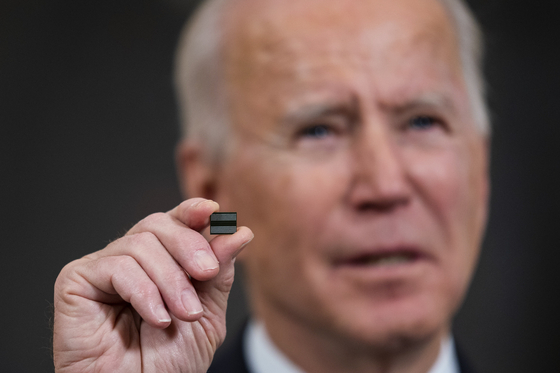![U.S. President Joe Biden signed an executive order at the White House on the 24th, ordering a review of the supply chain for four items, including semiconductors and batteries. [EPA=연합뉴스]](https://i0.wp.com/pds.joins.com/news/component/htmlphoto_mmdata/202102/25/dca2cec7-b630-4baf-9343-baebbdd908a1.jpg?w=560&ssl=1)
U.S. President Joe Biden signed an executive order at the White House on the 24th, ordering a review of the supply chain for four items, including semiconductors and batteries. [EPA=연합뉴스]
“Because there was no nail, the horseshoe disappeared, and because there was no horseshoe, the horses were lost. It continued and eventually the kingdom was destroyed. Semiconductors are the nails of the horseshoe in the 21st century.”
Biden, executive order to review semiconductor, battery and rare earth supply chain
“Identify weaknesses, prepare countermeasures…Invest here for US competitiveness”
Promoting production and investment in the United States, likely to strengthen alliance and supply chain
Congress also “produces in the US by allocating emergency budgets to avoid dependence on China”
U.S. President Joe Biden compared the semiconductor to a horseshoe’s nail while signing an executive order ordering a review of the global supply chain for semiconductors, automotive batteries, rare earths and pharmaceuticals on the 24th (local time). “Even a small failure at any point in the supply chain can impact the upper part of the supply chain,” he said.
The Biden administration has launched a policy to stably secure high-tech products essential for economy and national security, such as semiconductors and batteries. The calculation that the US will take back the semiconductor sovereignty that has passed to Asia has been laid.
President Biden announced to the administration on the same day that he would cooperate with industry and parliament to find a solution to the shortage of semiconductors, review the supply chain of four key items for the next 100 days, and come up with related policies.
Including the production of semiconductors and batteries, which are lagging behind competitors, and rare earths that are absolutely dependent on China, are paving the way for US-China competition. Separately, the supply chain was reviewed for a year in six industries, including defense, health, information and communication, energy, transportation, and food production.
“This is about resilience,” said President Biden. “It is to identify possible vulnerabilities in the supply chain and come up with alternatives or find workarounds.” The experience of disrupting the supply chain, such as the lack of personal protective equipment (PPE) in the early stage of the novel coronavirus infection (Corona 19) and the recent semiconductor supply shortage, the automobile production line was stopped, was the catalyst.
President Biden said, “The shortage of semiconductor chips has delayed the production of automobiles, which has reduced working hours for American workers,” and pointed out that the shortage of semiconductors also affected jobs. It announced a plan to revitalize the manufacturing industry by investing in the US to strengthen its supply chain. “The best way is to protect and hone our competitiveness by investing in our country,” he said. “We will invest in the United States, and we will invest in American workers.”
According to the US Semiconductor Industry Association (SIA), US semiconductor companies have 47% of the world’s semiconductor market share, but only 12% of the world’s semiconductors are produced in the US. 79% are manufactured in Asia. For this reason, there is a sense of crisis that failure to receive semiconductor supplies in an emergency could have a fatal impact on the US industry and national security as a whole.
![Chuck Schumer, Democratic Senate Representative. [EPA=연합뉴스]](https://i0.wp.com/pds.joins.com/news/component/htmlphoto_mmdata/202102/25/904d3567-c258-46e4-a304-1732bd24f63c.jpg?w=560&ssl=1)
Chuck Schumer, Democratic Senate Representative. [EPA=연합뉴스]
On that day, President Biden called about 10 opposition lawmakers from the Senate and House of Representatives to the White House, calling for bipartisan cooperation on measures against weak supply chains. Congress has started legislative work to strengthen the US semiconductor industry. Democratic Party Senate Chuck Schumer said on the day, “We will strengthen investments in the US semiconductor industry to stay ahead of the competition with China and stop dependence on foreign resources.”
“The semiconductor production sector is a dangerous weak point for our economy and national security,” he emphasized. “This must be changed.” “We shouldn’t rely on foreign manufacturers for semiconductors, and we shouldn’t let China get ahead of us in semiconductor manufacturing,” he said. “We should allocate an emergency budget to the’semiconductor program’.”
With the goal of legislation, Dr. Schumer aims to: ① increase the competitiveness of the United States over China by investing in innovation, workers and manufacturing in the United States ② invest in alliances and partners such as NATO, South Asia and India, and ③ damage American jobs. It proposed an end to all predatory practices in China.
The policy to strengthen the semiconductor industry in the US is expected to affect Korea as well. As President Biden suggested, it is possible to increase the proportion of semiconductor production by increasing investment in the US. It encourages the establishment of semiconductor factories in the United States by providing tax incentives and incentives at the federal level.
In a letter sent to President Biden on the 18th, related industries such as SIA said, “The US, which has no incentives when global competitors are attracting semiconductor manufacturing and research facilities, has steadily declined its share of semiconductor manufacturing.” It is necessary to encourage the construction of semiconductor manufacturing facilities and invest in research,” he suggested.
It is also possible to focus on expanding supply chains between alliances and partners to reduce dependence on China. Representative Schumer selected NATO, South Asia, and India as alliances that could invest in semiconductor production. Existing semiconductor manufacturing powerhouses such as Korea and Taiwan were not discussed.
Congress created a legal basis for the federal government to subsidize the U.S. semiconductor manufacturing industry through the Defense Authorization Act (NDAA) last year, and to provide federal funding for semiconductor research and development. According to this, a bill to allocate the relevant budget will be passed by this spring, Schumer said.
Washington = Correspondent Park Hyun-young [email protected]
![]()
